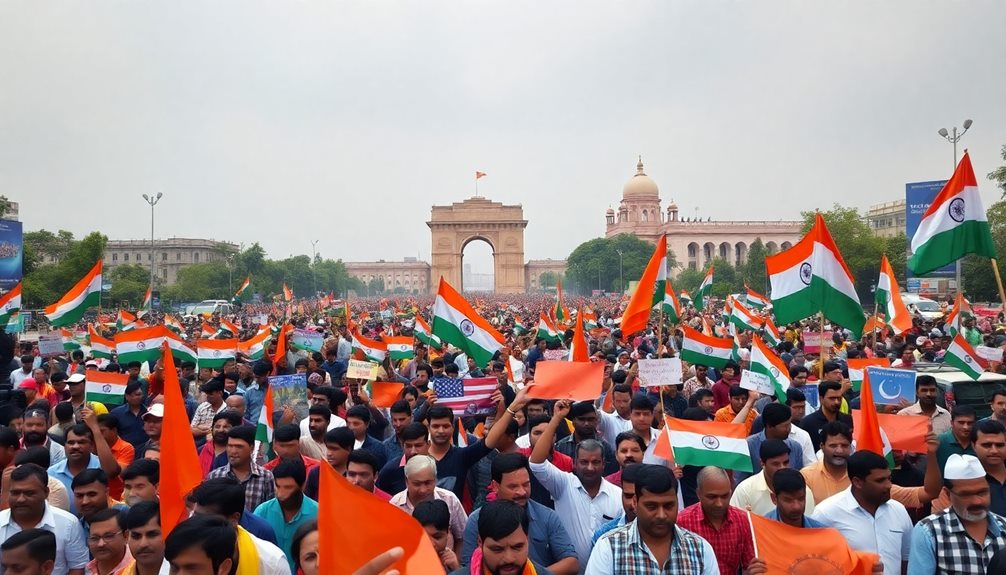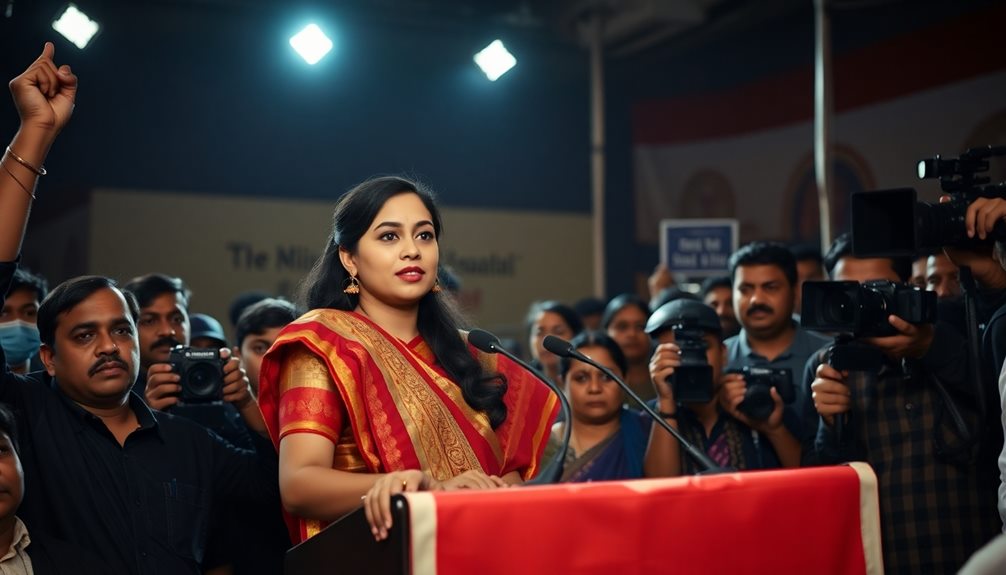Nupur Sharma's a prominent yet controversial figure in Indian politics, known for her assertive demeanor and sharp rhetoric. Born in 1985 in New Delhi, she began her political career as the president of the Delhi University Students' Union in 2008 and joined the Bharatiya Janata Party (BJP) shortly after. As an official spokesperson since 2020, her remarks on sensitive issues sparked national outrage and protests, leading to her suspension from the party. These events highlight the complex societal tensions in India, and tracing her journey reveals the intricacies of her political ascent and challenges ahead.
Key Takeaways
- Nupur Sharma, born in 1985, is a prominent figure in the BJP and began her political journey as president of Delhi University Students' Union in 2008.
- She holds a BA in Economics and a Bachelor of Laws from Delhi University, along with a Master's in International Business Law from LSE.
- Sharma gained national attention in 2022 due to controversial remarks about Prophet Muhammad, leading to significant backlash and protests.
- The BJP suspended her in June 2022, reflecting the party's attempt to distance itself from her contentious statements amid rising communal tensions.
- Despite legal challenges and public outcry, analysts suggest Sharma may have the potential to navigate controversies and revive her political career.
Introduction

Nupur Sharma is a notable figure in Indian politics, known for her assertive demeanor and vocal participation in political debates. Born in 1985 in New Delhi, she began her political career as the president of the Delhi University Students' Union in 2008, aligning with the Akhil Bharatiya Vidyarthi Parishad (ABVP).
Later, she joined the Bharatiya Janata Party (BJP) around 2010-2011, quickly making a name for herself. In 2020, she became the official spokesperson for the BJP, where her confrontational style during televised debates garnered national attention.
Sharma's political journey hasn't been without its challenges. In 2015, she contested the Delhi Legislative Assembly elections against Arvind Kejriwal. Although she lost, this experience highlighted the intense competition within Delhi's political landscape.
Despite the controversies arising from her remarks, Sharma has cultivated significant online support, making her a polarizing figure in Indian politics. Her presence in political discourse reflects the broader societal tensions and complexities that define contemporary Indian politics, positioning her as both a champion and a contentious character within the Bharatiya Janata Party.
Background

Growing up in a family steeped in civil services and business, Sharma developed a strong foundation for her future in politics. Born in New Delhi in 1985, Nupur Sharma attended Delhi Public School, Mathura Road, where her academic prowess began to shine. She graduated with a BA in economics from Hindu College, Delhi University, later earning her Bachelor of Laws from the same institution.
During her university years, she joined the Akhil Bharatiya Vidyarthi Parishad (ABVP) and took on a leadership role as the president of the Delhi University Students Union in 2008.
In 2010, Sharma transitioned into a political career by joining the Bharatiya Janata Party (BJP). After completing her Master's in International Business Law at the London School of Economics in 2011, she quickly made strides within the party.
Controversial Remarks Spark Outrage

A televised debate on May 26, 2022, marked a turning point in Nupur Sharma's political journey, as her controversial remarks about Prophet Muhammad ignited widespread outrage across India and beyond.
The backlash was immediate and intense, predominantly from Indian Muslims and various Islamic nations, leading to significant diplomatic tensions. In response to the uproar, the BJP suspended Sharma on June 5, 2022, aiming to mitigate the damage and protect the party's reputation amidst escalating calls for her resignation.
Her comments prompted multiple FIRs against her in various states, highlighting the legal consequences of her statements and the communal strife they incited. Protests erupted in several cities, including Kanpur, where demonstrators expressed their anger, resulting in violent clashes and numerous arrests. The unrest underscored the deep public discontent triggered by her remarks.
Internationally, several Gulf nations condemned Sharma's comments, summoning Indian ambassadors to voice their discontent and further complicating India's diplomatic relations with these countries.
The situation illustrated how a single statement could ripple through society and politics, drastically altering Sharma's trajectory in the BJP.
Mass Protests Across Major Cities

Mass protests erupted across major cities in India in response to Nupur Sharma's controversial remarks, with demonstrators calling for accountability from both Sharma and the BJP. The protests intensified particularly in Kanpur, where clashes between protestors and police resulted in injuries and over 54 arrests.
The unrest highlighted the growing societal tensions fueled by rising anti-Muslim sentiments and the perception that hate speech often goes unpunished in India.
Protesters expressed their outrage not just at Sharma's comments but also at what they saw as a broader pattern of communal violence incited by political rhetoric. The atmosphere in Kanpur turned volatile, reflecting the deep divisions within society.
International reactions further amplified the situation, with similar protests occurring in various Muslim-majority nations, indicating that the issue resonated well beyond India's borders.
Participants in the mass protests articulated their frustration over the lack of legal repercussions for inflammatory speech, emphasizing the need for accountability to prevent further escalation of communal tensions.
As the protests continued, they underscored the urgent need for dialogue and understanding in an increasingly polarized landscape.
Political Career in Jeopardy

Nupur Sharma's political career hangs in the balance following her controversial remarks about Prophet Muhammad, which ignited widespread outrage across India. In June 2022, the Bharatiya Janata Party (BJP) suspended Sharma and expelled fellow spokesperson Naveen Kumar Jindal, signaling a serious attempt to distance the party from her inflammatory comments.
These remarks have been linked to rising anti-Muslim sentiments, raising alarms about the potential long-term implications for communal relations under BJP governance.
As the backlash intensified, legal proceedings escalated, with multiple FIRs filed against Sharma across various states, complicating her political standing. The legal troubles cast a shadow on her future within the party and may deter potential supporters.
Despite these challenges, some analysts suggest that Sharma could still carve out a niche in politics, hinting at the intricate relationship between public perception and her viability as a political figure. Her ability to resonate with specific voter bases may hinge on her relatability and how effectively she navigates scrutiny, especially in the digital age. Much like the way the Sarah Palin financial profile became a lens through which critics and supporters assessed her priorities and decision-making, Sharma’s financial transparency could play a pivotal role in shaping public trust. Ultimately, her success might depend not just on policy positions but also on crafting a narrative that aligns with the aspirations of her constituents.
While Sharma faces significant hurdles, her political journey isn't entirely over. The evolving dynamics of Indian politics may still provide her avenues to navigate the controversies and re-establish herself, although the road ahead remains fraught with uncertainty.
Frequently Asked Questions
What Are Nupur Sharma's Key Political Achievements so Far?
Nupur Sharma's key political achievements include her active role in the Bharatiya Janata Party, where she's effectively advocated for various policies.
She's been instrumental in mobilizing youth support and engaging with grassroots movements.
Her contributions to debates, especially on national security and women's rights, have garnered attention.
Additionally, her presence in social media has amplified her influence, allowing her to connect with a wider audience and promote the party's agenda effectively.
How Has Her Education Influenced Her Political Ideology?
Education plays a significant role in shaping political ideology.
Nupur Sharma's academic background has equipped her with critical thinking skills and a deep understanding of legal frameworks. This knowledge informs her perspectives on governance and policy-making.
Her exposure to diverse viewpoints during her studies has also fostered a nuanced approach to political discourse.
Consequently, her education hasn't only influenced her beliefs but also enhanced her ability to engage effectively in political debates.
What Strategies Does She Employ to Connect With Voters?
To connect with voters, she employs a mix of grassroots outreach and social media engagement.
By attending local events, she personalizes her interactions, making constituents feel valued.
Her campaign's online presence allows her to share her message broadly, responding quickly to voter concerns.
She also highlights relatable issues, ensuring her platform resonates with diverse communities.
This combination of direct engagement and digital strategy helps her build trust and rapport with the electorate.
What Role Does Social Media Play in Her Political Outreach?
Social media plays a crucial role in her political outreach. It allows her to connect directly with voters, sharing her views and updates in real-time.
She utilizes platforms like Twitter and Instagram to engage with her audience, respond to their concerns, and promote her initiatives. By creating relatable content and leveraging trending topics, she effectively builds her presence and fosters a sense of community among her followers, enhancing her political influence.
How Do Her Views Align With Her Party's Official Stance?
Her views closely align with her party's official stance, reflecting a commitment to its core principles.
She often emphasizes nationalistic themes and advocates for policies that resonate with her party's agenda.
While she occasionally expresses personal opinions, they generally mirror the party's broader ideology.
This alignment strengthens her position within the party and enhances her credibility among supporters, ensuring she remains a significant voice in political discussions and decision-making processes.










